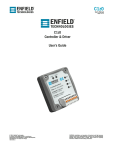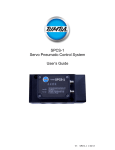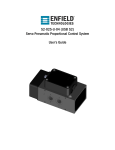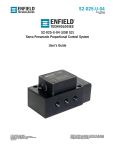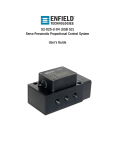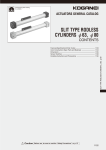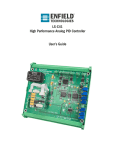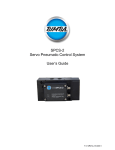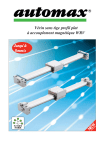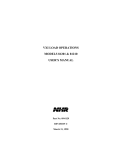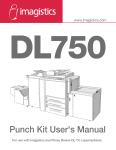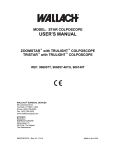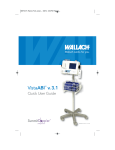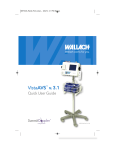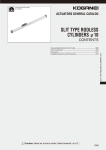Download S2 Servo Pneumatic Proportional Control System User`s Guide
Transcript
S2 Servo Pneumatic Proportional Control System User’s Guide S2 User’s Manual Page 1 of 13 Table of Contents Warnings & Notices 2 Quick Start Procedure 3 Factory Default Settings 4 LEDs 4 System Setup 5 Feedback 6 Potentiometers/Tuning 7 Jumpers 9 Command Configuration 10 Feedback Configuration 10 Cylinder Size 11 Valve Aperture 11 Maximum Moving Mass 12 Troubleshooting 13 © 2011 Enfield Technologies As Enfield Technologies strives for continuous improvement and dedication to product development, specifications are subject to change v20110311 WARNING: Installation and operation of electronic and high pressure systems (fluids and compressed gas) involves risk including property damage and personal injury or death. Users should be properly trained or certified and take safety precautions. S2 User’s Manual Page 2 of 13 Warnings & Notices WARNING: Installation and operation of electric and high pressure systems (fluids and compressed gas) involves risk including property damage and personal injury or death. Installers and users should be properly trained or certified and take safety precautions. This product may cause death, personal injury, or property damage if improperly used or installed. The information in this document and other information from Enfield Technologies and its authorized representatives are intended for use by persons having technical expertise in selecting and using these products. Product owners (“you”) should analyze all technical and safety requirements of your specific application, including the consequences of any possible failure, before selecting a product. This product may not be suitable for all applications, such as those acting upon people. Suitability is solely your responsibility. Because the requirements for each application may vary considerably, you are solely responsible for conducting any testing or analysis that may be required to determine the suitability of the product for your application, and to ensure that all performance, safety and warning requirements for your application are met. Caution: While the product is low voltage, it contains open-frame electronic components and care should be taken to prevent unintentional contact with the product to avoid damage to person or property. The S2 is an electro-static sensitive device. Use appropriate electro-static discharge (ESD) procedures during handling and installation. Notice: Use and purchase of this product is subject to Enfield Technologies’ Terms and Conditions of Sale and Use. Improper installation or use voids warranty. Consult factory regarding special applications. Specifications are subject to change. Reasonable efforts have been made to provide useful and correct information in this document, but this document may contain errors and omissions, and it is subject to change. Contact: Enfield Technologies 35 Nutmeg Drive Trumbull, CT 06611 USA +1 203 375 3100 +1 800 504 3334 toll free North America [email protected] www.enfieldtech.com © 2011 Enfield Technologies As Enfield Technologies strives for continuous improvement and dedication to product development, specifications are subject to change v20110311 WARNING: Installation and operation of electronic and high pressure systems (fluids and compressed gas) involves risk including property damage and personal injury or death. Users should be properly trained or certified and take safety precautions. S2 User’s Manual Page 3 of 13 Quick Start Procedure 1. Configure Jumpers a. Configure Jumpers 2 and 3 to select a command input of 0…10Vdc or 4…20mA b. Configure Jumpers 5 and 6 to select a feedback input of 0…10Vdc or 4…20mA c. Configure Jumper 1 to select cylinder size 2. Wire Feedback a. For 4…20mA signals: 4mA should correspond to the cylinder fully retracted and 20mA should correspond to the cylinder fully extended. Also, for 4…20mA signals, low side should connect to ground. b. For 0…10V signals: 0V should correspond to the cylinder fully retracted and 10V should correspond to the cylinder fully extended 3. Wire Command 4. Wire Power 5. Connect Pneumatic Lines a. Connect port 2 of the S2 to the back of the cylinder and port 4 to the front as shown in “system setup” b. Inlet air should be dry (-40F dew point) non-lubricated air, non-flammable & non-corrosive dry gases (0.3 micron fine grade coalescing filter with 5 micron pre-filter) at 0-150psig. c. Connect Inlet air to Port 1 6. Tune System a. Restore potentiometers to factory default settings b. Tune System According to Recommended Tuning Method 7. Troubleshooting a. See “Troubleshooting” b. Contact Enfield Technologies for additional help © 2011 Enfield Technologies As Enfield Technologies strives for continuous improvement and dedication to product development, specifications are subject to change v20110311 WARNING: Installation and operation of electronic and high pressure systems (fluids and compressed gas) involves risk including property damage and personal injury or death. Users should be properly trained or certified and take safety precautions. S2 User’s Manual Page 4 of 13 Factory Default Setting Potentiometer Factory Default Condition Setting RP1 - Responsiveness RP2 - Speed Damping RP3 - Force Damping RP4 - Offset Fully CCW Fully CCW Fully CCW In middle (Status LED on) Responsiveness gain is zero Speed Damping gain is zero Force Damping gain is zero Offset is zero Jumper Factory Default Condition Setting J1 - Cylinder Size J2 - Command J3 - Command J4 - Current Maximum J5 - Feedback J6 - Feedback Configuration #2 Jumper Off Jumper Off Jumper on Jumper Off Jumper Off Area Ratio = 0.905 0…10V Command 0…10V Command 100% 0…10V Feedback 0…10V Feedback LEDs LED On Off Power LED Status LED Power is On Offset ≈ 0 (RP4 is cenetered) Power is Off 0ffset ≠ 0 © 2011 Enfield Technologies As Enfield Technologies strives for continuous improvement and dedication to product development, specifications are subject to change v20110311 WARNING: Installation and operation of electronic and high pressure systems (fluids and compressed gas) involves risk including property damage and personal injury or death. Users should be properly trained or certified and take safety precautions. S2 User’s Manual Page 5 of 13 System Setup © 2011 Enfield Technologies As Enfield Technologies strives for continuous improvement and dedication to product development, specifications are subject to change v20110311 WARNING: Installation and operation of electronic and high pressure systems (fluids and compressed gas) involves risk including property damage and personal injury or death. Users should be properly trained or certified and take safety precautions. S2 User’s Manual Page 6 of 13 Feedback Setup Resistive Feedback Devices For Resistive Feedback devices: the grey wire of the S2, +10V, should be connected to the high side of the resistor, the blue wire, ground, should be connected to the low side of the resistor, and the white wire, feedback, should be connected to the output. Ensure proper polarity with a +10V output corresponding to the fully extended position and a 0V output corresponding to the fully retracted cylinder positions. Powered Feedback Devices When using a powered feedback sensor, use manufacturer’s requirements for powering the sensor. The output of the sensor should be connected to the white wire, feedback, of the S2. For 4…20mA feedback signals, ensure that the low side is connected to ground, the blue wire of the S2. For 0…10Vdc sensors, ensure proper polarity with a +10V output corresponding to the fully extended position and a 0V output corresponding to the fully retracted cylinder positions. For 4…20mA sensors, ensure proper polarity with a 20mA output corresponding to the fully extended position and a 4mA output corresponding to the fully retracted cylinder positions © 2011 Enfield Technologies As Enfield Technologies strives for continuous improvement and dedication to product development, specifications are subject to change v20110311 WARNING: Installation and operation of electronic and high pressure systems (fluids and compressed gas) involves risk including property damage and personal injury or death. Users should be properly trained or certified and take safety precautions. S2 User’s Manual Page 7 of 13 Potentiometers/Tuning 4) Offset By adjusting RP4, the user can set the offset of the system. Offset is used when the cylinder is mounted vertically to create symmetrical motion. If the cylinder is facing rod up the offset should be increased. When a cylinder is facing down the offset should be decreased to create symmetrical motion. The offset can be increased or decreased by turning RP4 clockwise or counterclockwise, respectively. Recommended Tuning Method Return S2 to Factory Defaults The S2 has 4 potentiometers (Responsiveness, Speed Damping, Force Damping, and Offset) which allow for maximum flexibility. A polymer non-conductive screwdriver is the preferred method for adjusting the potentiometers. Care should be taken not to allow metal screwdrivers to touch other components on the board. 1) Responsiveness (RP1) –By adjusting RP1, the user can adjust the responsiveness of the pneumatic cylinder to changes in command or feedback. The responsiveness of the cylinder can be increased or decreased by turning RP1 clockwise or counterclockwise, respectively. A gain that is too low can result in an unresponsive system while a gain that is too high can cause the system to become unstable. 2) Speed Damping (RP2) – By adjusting RP2, the user can set the speed damping applied to the system. This damping can be increased or decreased by turning RP2 clockwise or counterclockwise, respectively. Speed damping helps reduce overshoot and smoothes out system performance. However, too much speed damping can cause the system to undershoot and “creep” into the target position or become unstable. 3) Force Damping (RP3) – By adjusting RP3, the user can set force damping applied to the system. Damping can be increased or decreased by turning RP3 clockwise or counterclockwise, respectively. Force Damping helps increase the stability of the system. Too little force damping can result in an oscillatory system while too much damping can result in an unresponsive system, resulting in steady state error. © 2011 Enfield Technologies As Enfield Technologies strives for continuous improvement and dedication to product development, specifications are subject to change v20110311 1) Turn off air and power to the system. 2) Turn RP1, RP2 and RP3 fully counterclockwise. Make sure to go at least 11 full turns. (FYI these pots do not have “bottoming out” indication) 3) Provide power to the controller. 4) Adjust RP4 until green LED is on. (center position) Tune System 5) Turn on air to the S2. 6) Provide a continuously varying command signal to the S2. A 0.1Hz square wave would be ideal. 7) Turn RP1 (responsiveness) clockwise slowly. The system should begin to move. If the system does not move or “rails” consult system setup diagram. 8) Once the system begins to follow the command signal, continue increasing RP1 until some overshoot or oscillation is obtained, or desired speed is reached. 9) Adjust RP3 (force damping) clockwise until the overshoot is dampened. 10) Repeat steps 8 and 9 as necessary, until the system exhibits the desired dynamics. 11) To optimize system performance, slowly decrease RP3 (force damping) and increase RP2 (speed damping) until optimum system performance is reached. 12) If the motion is asymmetrical, RP4 (offset) can be adjusted to compensate. Also insure that proper cylinder size has been selected on Jumper 1. WARNING: Installation and operation of electronic and high pressure systems (fluids and compressed gas) involves risk including property damage and personal injury or death. Users should be properly trained or certified and take safety precautions. S2 User’s Manual Page 8 of 13 Jumpers Step 1: Turn off air and power. Step 2: Remove 4 phillips head screws Step 3: Remove Cover to acess jumpers © 2011 Enfield Technologies As Enfield Technologies strives for continuous improvement and dedication to product development, specifications are subject to change v20110311 WARNING: Installation and operation of electronic and high pressure systems (fluids and compressed gas) involves risk including property damage and personal injury or death. Users should be properly trained or certified and take safety precautions. S2 User’s Manual Page 9 of 13 Step 4: Set Command Step 5: Set Feedback Configure Command for 0…10Vdc (Jumper Off) Configure Feedback for 0…10Vdc (Jumper Off) J2 J3 Configure Command for 4…20mA (Jumper On) J2 © 2011 Enfield Technologies As Enfield Technologies strives for continuous improvement and dedication to product development, specifications are subject to change v20110311 J3 J5 J6 Configure Feedback for 4…20mA (Jumper On) J5 J6 WARNING: Installation and operation of electronic and high pressure systems (fluids and compressed gas) involves risk including property damage and personal injury or death. Users should be properly trained or certified and take safety precautions. S2 User’s Manual Page 10 of 13 Step 6: Set Cylinder Size Configuration of J1 Step 7: Set Current Maximum Config #1 A1/A2 Ratio 0.88 Config #2 0.905 (default) Config #3 0.9375 Config #4 1 (Rodless Cylinders) Configuration of J4 Config #1 Valve Aperture Max 100% (defualt) Config #2 50% A1 = Surface Area on Rod Side of Cylinder A2 = Surface Area on Piston Side of Cylinder © 2011 Enfield Technologies As Enfield Technologies strives for continuous improvement and dedication to product development, specifications are subject to change v20110311 WARNING: Installation and operation of electronic and high pressure systems (fluids and compressed gas) involves risk including property damage and personal injury or death. Users should be properly trained or certified and take safety precautions. S2 User’s Manual Page 11 of 13 Maximum Moving Mass The table below recommends the maximum moving mass for a cylinder controlled by a S2 for horizontal and vertical applications. Actual mass will vary based on cylinder speed and mechanical assembly (e.g. friction in cylinder or system, air pressure, etc.) Cylinder Bore Size (Inches) 3/4 7/8 1-1/16 1-1/4 1-1/2 1-3/4 2 2-1/2 3 Maximum Weight (Pounds) Horizontal Vertical 25 7 35 9 55 15 75 20 110 25 150 35 200 50 310 80 450 110 © 2011 Enfield Technologies As Enfield Technologies strives for continuous improvement and dedication to product development, specifications are subject to change v20110311 WARNING: Installation and operation of electronic and high pressure systems (fluids and compressed gas) involves risk including property damage and personal injury or death. Users should be properly trained or certified and take safety precautions. S2 User’s Manual Page 12 of 13 Troubleshooting Symptom Probable Causes Corrective Action System Totally Unresponsive Power Not Applied Air Off Speed Gain too Low Signal Wiring Apply power, check all power wiring Turn air on Increase Speed Gain (RP1) Verify signal wiring for command and feedback; also verify mechanical system polarity Verify all Wiring Speed Gain too Low Increase Speed Gain (RP1) Force Damping Gain too High Power Supply Voltage not Stable Decrease Force Damping (RP3) Check power wiring; change power supply Decrease moving mass, increase cylinder size, or increase inlet pressure. Connect Feedback Signal Verify all wiring is as shown in application examples and as described in the “System Setup” section of this document Verify Polarity of Cylinder as shown in “System Setup” Verify all wiring is as shown in application examples and as described in the “Installation” section of this document Insure mechanical system is free from binding and high friction. Increase Speed gain (RP1) Decrease Force Damping Gain (RP3) Adjust offset gain (RP4) Set jumper for correct area ratio. See Jumpers Section. Insure there are no air leaks in the system Insure that inlet air meets valve specifications. See “System Setup” Decrease Speed (RP1) Increase Force Damping (RP3) Decrease speed damping. (RP2) Verify that large or high power machinery is not operating nearby. Also, verify input signal integrity by examining the signal with an oscilloscope. Verify all wiring as shown in the “System Setup” section of this document Verify all DC common connections This is an artifact of the built-in dither and is intended to keep the electro-mechanical device in constant motion. Inverted Polarity System Mildly Responsive or Sluggish Cylinder too Small System ‘Pegs’ or ‘Rails’ No Feedback Signal Feedback Connected Improperly Cylinder Connected Improperly System Fails to Converge or is Inaccurate Incorrect Wiring Mechanical System Speed Gain too Low Force Damping too high Offset Gain Adjusted incorrectly Wrong Area Ratio Air Leaks S2 Sticking System Oscillates Speed Gain too High Not Enough Force Damping Speed Damping too high System ‘Buzzes’ Input Signal Noise (possibly 60Hz) Input Signals not connected DC Common not connected High Pitched Tone or Whine from S2 Dither Warranty: This product is covered by a 1 year Enfield Technologies limited warranty. Contact Enfield Technologies or visit website for more details. Notice: Use and purchase of this product is subject to Enfield Technologies’ Terms and Conditions of Sale and Use. Improper installation or use voids warranty. This product may not be suitable for all applications, such as those acting upon people, and suitability is solely the buyer’s responsibility. Consult factory regarding special applications. © 2011 Enfield Technologies As Enfield Technologies strives for continuous improvement and dedication to product development, specifications are subject to change v20110311 WARNING: Installation and operation of electronic and high pressure systems (fluids and compressed gas) involves risk including property damage and personal injury or death. Users should be properly trained or certified and take safety precautions.













